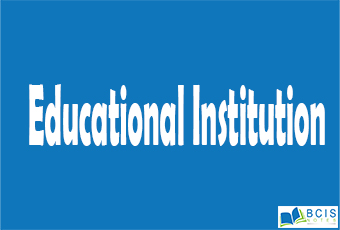
Educational Institution
The term education is derived from the Latin word -EDUCARE which means ‘to bring up in an educational institution. The idea of education is not only to impart knowledge to the students in some areas of study but to develop those habits and attitudes in him/her, with which they may successfully face the future.
- Education is an inseparable part of human life. Without it, human life is not incomplete but also painful and hopeless.
- Education explores – all-around opportunities for Human development. Education is both Means and ends of human development.
Definitions of Education:
- United Nations defines(1997),“ Education is fundamental to enhance to quality of human life and ensuring social and economic progress.”
- World bank1998/99, “Education is the key to creating, adopting and spreading knowledge, But the gains in access to education have been unevenly distributed, with the poor seldom getting their fair share.”
Education as an Institution(Educational Institution)
- The unequal access to education has stratified countries based on economic and social development.
- Various Educational activities, where academics are launched as per the demand of society.
- The very existence of society depends upon the transmission of culture to the young generation. To continue the same tradition of a specific society, the new generation must be given training. Thus, education has been developed as one of the ways to fulfill the need to train a member of society.
- John j.Macionis has defined education as an institution as -Education is a social institution that directs the fundamental facts, employment skills, cultural values of humanity, and the transformation of knowledge.
History in general:
- Education was informal in pre-industrial societies. Education was provided through churches, temples, Musjids, Gumbas, etc. and that education was more associated with religion.
- But, with the modernization changes has been occurred in the exchange objectives, and nature of participation in education, therefore scientific and practical education has been developed.
- Education is the major tool of the socialization process.
The knowledge, culture, values, beliefs, languages, arts, literature, technologies that are developed in society is transferred to other societies through education. Which transfer from one individual to another and from one generation to the next.
Function:
- High social mobility
- Fosters social progress and prosperity
- Helps to complete the Socialization process
- Transmits the National Heritage
- Helps to reform Attitudes and Behavior for Complete Personality
- Provides Skill as an Agent of livelihood
- It acts as an Integrative force
- Helps in strengthening Democracy and Democratizing Process
- It is an Agent of Social Transformation
Types of Educational Institution:
- Formal Educational system
- Informal Educational system
Formal Educational system
- Different schools, colleges, and universities are established in order to provide knowledge, skill, and formal degrees.
- Universally accepted degrees.
- Formal syllabus, formal division of labor, evaluation, and assessment is carried out formally in order to cherish the goal of the organization.
Informal Educational System:
- Informal education is a general term for education that can occur outside of a structured curriculum.
- Informal education encompasses student interests within a curriculum in a regular classroom but is not limited to that setting. It works through conversation and the exploration and enlargement of experience.
- In order, to literate the citizens, the state can launch some informal education. For example; awareness programs, adult education, literacy program, etc.
Differences between informal and non-formal education
- In informal education, we do not learn things in any classroom or any systematic way. In a word every aspect, we learn from nature and observations such as education is informal education. Non-formal education is defined as formal. nor informal but knowledge is acquired through books, social media, or digital media.
Contextualizing to our Nepalese society, we have three major educational institutions:
- Government-owned system
- Community-based system
- Private educational system
Functionalistic Perspective:
- Functionalistic view education as meeting basic social needs. They believe that one purpose of education is to operate as a meritocracy( reward according to their achievement). To do so the school must create equal opportunity.
- Today society assign peoples job according to their ability.
Functions of Education according to the Functionalists perspective:
- Technical Training: To Function in the modern industrialized society a better-educated population.
Today society demands Technically trained and skilled individuals for every work. Such as running a shop, drive a car, If we could not read and write, add or subtract will be difficult. Education & technical training prepares people for it. - Selection of Allocation: Everyone has not an equal capacity to learn any given skills or areas of knowledge. The important function of education is to select those who can learn, teach them by that ability, allocates them to positions that match their capabilities.
Today educational research has shown that different people have the capacities to excel in different kinds of skills and knowledge. - Education to Democracy: Education enables people to participate in a democratic society.
( Understand how the political system works? Which political officials have the power to make a particular decision )
Conflict Perspective on Education:
- The Coleman report that the social and economic background of students is strongly co-related to how much students learn and the amount of education that they ultimately get.
- Conflict theorists argue that the main function of education is to pass economic, racial, and sexual inequality from one generation to the next.
- To conflict theorists’ beliefs that there is an absence of equal opportunities in schools or, (unequal funding by social class).
- The upper class or ruling class identified the number of ways in which the education system encourages learning and advancement in children from a good economic background and discourages other backgrounds.
You may also like similar topics in Sociology

Leave a Reply